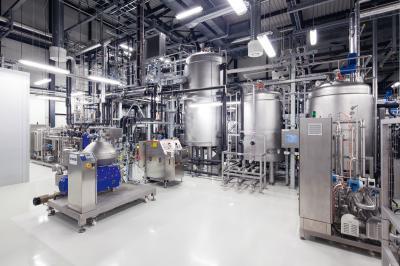Some people insist that Big Oil is in control of energy because so many products, from plastic to rubber, use it. It's just the opposite, people came up with so many uses because it was there. To claim otherwise is like blaming toasters for the invention of electricity.
Peak Oil is now 20 years behind schedule but eventually doomsday prophets will be right. For that reason, researchers are investigating possibilities for using renewable raw materials to replace oil. One well-known example of this is biodiesel, which comes not from oil sources, but from fields of yellow-flowering rape. Isobutene, a basic chemical used in the chemical industry to produce fuels, solvents, elastomers or even anti-knock agents in fuel, could be produced from sugar.
Researchers at the Fraunhofer Center for Chemical-Biotechnological Processes CBP in Leuna are planning to set up a pilot plant.
Valuable product of "digestion"
The basis of this was provided by staff at the company Global Bioenergies: They introduced the unique metabolic conversion of sugar to isobutene into a microorganism: If sugar is added to this microorganism, it "digests" it – and out comes gaseous isobutene. To develop and construct this pilot plant, Global Energies will receive 5.7 million euros from the German Federal Ministry of Education and Research BMBF. The company got the CBP on board as a partner.
"We have the expertise for both the biotechnological and the chemical processes, and we meet all the requirements for successfully getting the project off the ground" said a very pleased Gerd Unkelbach, Director of CBP. "For example, we are able to handle isobutene: when mixed with air explosive mixtures are formed".

In the pilot plant at the Fraunhofer Center for Chemical-Biotechnological Processes, researchers are producing oil substitutes from renewable raw materials. Credit: Gunter Binsack/Fraunhofer Center for Chemical-Biotechnological Processes
Construction of the 600 m2 pilot plant will start in the CBP technical center as of the fall of 2014 and it is planned that it will come into operation a year later. The large-scale processes will take place like in the laboratory: Sugar and the microorganism go into a fermenter which converts the sugar to gaseous isobutene. The isobutene is separated, purified, liquefied and filled into containers. Once the process has been transferred from the laboratory to the pilot scale, the plant will produce up to 100 tons of isobutene per year.
Sugar from wood
Sugar as a raw material has a big advantage over oil: It grows back. However, as a result of this, isobutene production is in competition with the food industry, as the sugar that ends up in the pilot plant is lost as a foodstuff. For this reason the researchers want to change tack in future, away from sugar from sugar beet to sugar from renewable raw materials that are not suitable as foods. Wood for example.
"The sugar we use is thus totally independent of food production" explained Unkelbach. The technological basis of this is already available at the CPB in the lignocellulose biorefinery. Here the researchers break wood down into its individual components: Cellulose, i.e. sugar, hemicelluloses and lignin.





Comments